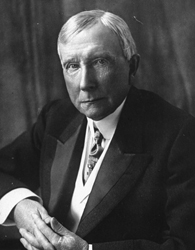As the main shareholder of the notorious Standard Oil Trust, John D. Rockefeller was not only America’s first billionaire, he was also one of the country’s greatest philanthropists. His multiple charitable foundations continue to provide for worthy causes to this day.
John D. Rockefeller’s Early Days
John Davison Rockefeller was born on July 8, 1839, in Richford, New York. He showed an ability to manage money and accumulate wealth at an early age. PBS explains that by the time he was 12 years old, he had saved more than $50 and even managed to loan it out at a 7 percent interest rate. In high school, he was a math whiz.
He got his first job at age 16 as an assistant bookkeeper. John worked extremely hard for four years, and then went into business for himself as a commission merchant before he was 20. The business made tremendous profits in its first year.
Sources in this Story
- PBS: John D. Rockefeller Senior, 1839-1937
- The Rockefeller Archive Center: John D. Rockefeller, 1839-1937
- Cornell University Law School: Legal Information Institute: Antitrust
- The New York Times: Biggest Trust of All
- Encyclopedia Britannica: John D. Rockefeller
- The Rockefeller Archive Center: Collections: Rockefeller Related Organizations
- The University of Chicago: History of the University
- The Rockefeller University: History
- The Rockefeller Foundation: Timeline
- The New York Times: John D. Rockefeller Dies at 97 in His Florida Home
Rockefeller and Standard Oil
Soon after forming the commissions business, Rockefeller and his partner, Maurice Clark, decided to expand into the business of oil refinery. As the oil industry grew, they acquired more partners, until there were five owners of the company. When the owners began to disagree, they decided to sell the company to the highest bidder among them.
Rockefeller bought the company for $72,500 and formed a partnership with Samuel Andrews, one of the founders who had refining experience. By 1870, Rockefeller and his partners had formed The Standard Oil Company, which owned most of the country’s refining firms. In 1882, it combined all its property into the Standard Oil Trust, but the Trust was dissolved because a court ruled that it violated the Sherman Antitrust Act.
When the Senate investigated the Standard Oil Trust, Rockefeller testified in a public hearing. In 1888, The New York Times reported that he was an agreeable witness. He was polite and repeatedly testified that the Trust had no ulterior motives. He was asked if the goal of the Trust was to control prices of oil, and he responded that the point of the Trust was “to place the business in its simplest and best form.”
The Standard Oil Trust was actually a main impetus for the passing of the Sherman Antitrust Act. However, once Rockefeller saw that his trust would be ruled unlawful, he divided the stock among affiliates in other states, but arranged it so that the same nine trustees still retained control. The Standard Oil Company was broken up again in 1911, when the U.S. Supreme Court ruled that it violated the Sherman Antitrust Act.
Rockefeller’s Philanthropy
At the age of 58, Rockefeller stepped down from running Standard Oil to focus on philanthropy, committing particularly to funding education. Rockefeller’s General Education Board allocated money for public and secondary schools and for universities and scholarship programs. According to the Rockefeller Archives Center, one of the most essential tenets of the board was that it provided educational aid “without distinction of race, sex or creed.”
In conjunction with the American Baptist Education Society, Rockefeller also founded The University of Chicago. According to the University’s web site, he called it “the best investment I ever made.”
In 1901, Rockefeller founded the Rockefeller Institute of Medical Research. Devoted to biomedical research and the origins of disease, it was the first center of its kind. Eventually renamed Rockefeller University, its researchers have won a collective 23 Nobel Prizes.
The Rockefeller Foundation, a philanthropic organization established by Rockefeller and incorporated in 1913, continues to thrive. A timeline on the Foundation’s web site details its development and projects from 1913 to the present.
Rockefeller had hoped to reach the age of 100, but fell three years short of his goal when he died suddenly of sclerotic myocarditis on May 23, 1937, at his home in Florida.
This article was originally written by Rachel Balik; it was updated June 1, 2017.











